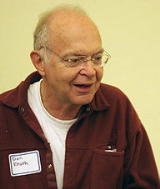
Donald Knuth
Donald Ervin Knuth Professor Emeritus of the Art of Computer Programming at Stanford University, is a renowned computer scientist and winner of the 1974 Turing Award.
Sourced
- Beware of bugs in the above code; I have only proved it correct, not tried it.
- Donald Knuth's webpage states the line was used to end a memo entitled Notes on the van Emde Boas construction of priority deques: An instructive use of recursion (1977)
- I can’t be as confident about computer science as I can about biology. Biology easily has 500 years of exciting problems to work on. It’s at that level.
- Computer Literacy Bookshops Interview Computer Literacy Bookshops Interview (1993)
- On why bioinformatics is very exciting
- Computer Literacy Bookshops Interview Computer Literacy Bookshops Interview (1993)
- The psychological profiling [of a programmer] is mostly the ability to shift levels of abstraction, from low level to high level. To see something in the small and to see something in the large.
- Jack Woehr. An interview with Donald Knuth. Dr. Dobb's Journal, pages 16-22 (April 1996)
- The important thing, once you have enough to eat and a nice house, is what you can do for others, what you can contribute to the enterprise as a whole.
- Jack Woehr. An interview with Donald Knuth. Dr. Dobb's Journal, pages 16-22 (April 1996)
- The whole thing that makes a mathematician’s life worthwhile is that he gets the grudging admiration of three or four colleagues.
- Jack Woehr. An interview with Donald Knuth. Dr. Dobb's Journal, pages 16-22 (April 1996)
- Science is what we understand well enough to explain to a computer. Art is everything else we do.
- Foreword to the book A=B (1996)
- A mathematical formula should never be "owned" by anybody! Mathematics belong to God.
- Digital Typography, ch. 1, p. 8 (1999)
- I define UNIX as 30 definitions of regular expressions living under one roof.
- Digital Typography, ch. 33, p. 649 (1999)
- I can’t go to a restaurant and order food because I keep looking at the fonts on the menu.
- Email is a wonderful thing for people whose role in life is to be on top of things. But not for me; my role is to be on the bottom of things. What I do takes long hours of studying and uninterruptible concentration.
The Art of Computer Programming (1968-2005)
- An algorithm must be seen to be believed.
- Vol. I, Fundamental Algorithms, Section 1.1 (1968)
- The sun comes up just about as often as it goes down, in the long run, but this doesn't make its motion random.
- Vol. II, Seminumerical Algorithms, Section 3.3.2 part B, first paragraph (1969)
- The reason is not to glorify "bit chasing"; a more fundamental issue is at stake here: Numerical subroutines should deliver results that satisfy simple, useful mathematical laws whenever possible. [...] Without any underlying symmetry properties, the job of proving interesting results becomes extremely unpleasant. The enjoyment of one's tools is an essential ingredient of successful work.
- Vol. II,
- Any inaccuracies in this index may be explained by the fact that it has been sorted with the help of a computer.
- Vol. III, Sorting and Searching, End of index (1973)
Computer Programming as an Art (1974)
1974 Turing Award Lecturehttp://fresh.homeunix.net/~luke/misc/knuth-turingaward.pdf, Communications of the ACM 17 (12), (December 1974), pp. 667–673- Science is knowledge which we understand so well that we can teach it to a computer; and if we don't fully understand something, it is an art to deal with it.
- p. 668
- We should continually be striving to transform every art into a science: in the process, we advance the art.
- p. 669 [italics in source]
- Premature optimization is the root of all evil (or at least most of it) in programming.
- p. 671
- Premature optimization is the root of all evil.
- Variant in Knuth, "Structured Programming with Goto Statements". Computing Surveys 6:4 (December 1974), pp. 261–301, §1.
- Knuth refers to this as "Hoare's Dictum" 15 years later in "The Errors of Tex", Software—Practice & Experience 19:7 (July 1989), pp. 607–685. However, the attribution to C. A. R. Hoare is doubtful.http://shreevatsa.wordpress.com/2008/05/16/premature-optimization-is-the-root-of-all-evil/
- All three of these papers are reprinted in Knuth, Literate Programming, 1992, Center for the Study of Language and Information ISBN 0937073806
- Computer programming is an art, because it applies accumulated knowledge to the world, because it requires skill and ingenuity, and especially because it produces objects of beauty. A programmer who subconsciously views himself as an artist will enjoy what he does and will do it better.
- p. 673
Quotes about
- For his major contributions to the analysis of algorithms and the design of programming languages, and in particular for his contributions to the "art of computer programming" through his well-known books in a continuous series by this title.
- 1974 Turing Award Citationhttp://awards.acm.org/citation.cfm?id=7143252&srt=all&aw=140&ao=AMTURING
